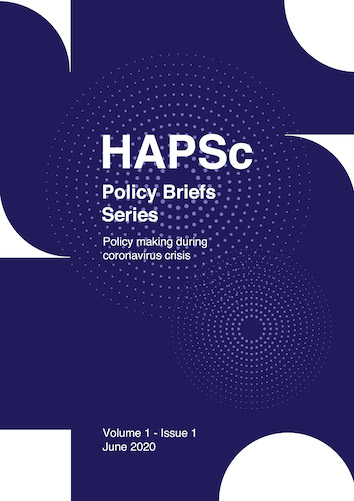Strengthening European local governments to address global health crises and their consequences
Résumé
The crisis generated by Covid-19 is a product of global interconnection, but its impacts are manifested locally in a differentiated manner. This text assumes precisely that local governments, as the administration closest to the citizens, are a key instrument to face the effects of this and other global risks in a more democratic and effective way, because they can provide differentiated and more adequate responses to the concrete needs of the citizens. Moreover, if decisions taken at a local level are widely participated and deliberated by the population, they are more legitimate, and this makes it easier for citizens to accept measures that restrict freedoms, such as those imposed worldwide by the public health measures taken in response to Covid-19. In line with these assumptions, in this policy paper we highlight the need to strengthen European local governments by giving them greater resources and more autonomy. Our position is consistent with the recommendations made by international bodies during the current pandemic, but it is also supported by the evidence the authors have gathered from their participation in a European research project within the H2020 program (COST Action IS 1207 LocRef). Based on the results of this research, a series of practical recommendations are proposed for the European Union and the member countries to grant increased resources and a greater degree of autonomy to local governments.
Article Details
- Comment citer
-
Iglesias, A., & Barbeito, R. (2020). Strengthening European local governments to address global health crises and their consequences. HAPSc Policy Briefs Series, 1(1), 75–80. https://doi.org/10.12681/hapscpbs.24951
- Rubrique
- Articles

Ce travail est disponible sous la licence Creative Commons Attribution 4.0 International .
Authors retain copyright and grant the journal right of first publication with the work simultaneously licensed under a Creative Commons Attribution License that allows others to share the work with an acknowledgement of the work's authorship and initial publication in this journal.Téléchargements
Les données relatives au téléchargement ne sont pas encore disponibles.
Références
Barbeito, R.; Iglesias, A. (2020). Quarantined Democracies: Policy Responses to Covid-19 and their Effects on Democracy, Revista Española de Sociología, 29 (2) (Forthcoming).
Dahl, R. (2014). The City in the Future of Democracy. Published online by Cambridge University Press: 01 August 2014. DOI: https://doi.org/10.2307/1953398
Denters, B. (2017). Participation and Democratic Accountability: Making a Difference for the Citizens. In: Schab, Ch; Bouckaert, G; Kuhlmann, S. (Eds.), The Future of Local Government in Europe. Lessons from Research and Practice in 31 Countries. Baden-Baden: Nomos.
Foa, R.S., Klassen, A., Slade, M., Rand, A., Collins, R. (2020). The global satisfaction with democracy report 2020. Cambridge: Centre for the Future of Democracy, Cambridge University.
Kersting N., Gasparikova J., Iglesias A., Krenjova J. (2016). Local Democratic Renewal by Deliberative Participatory Instruments: Participatory Budgeting in Comparative Study. In: Kuhlmann S., Bouckaert G. (eds), Local Public Sector Reforms in Times of Crisis. Governance and Public Management. London: Palgrave Macmillan. doi.org/10.1057/978-1-137-52548-2_18.
Schwab, Ch; Bouckaert, Kuhlmann, S. (2017). Conclusion. In: Schwab, Ch.; Bouckaert, G.; Kuhlmann, S. (eds.), The Future of Local Government in Europe: Lessons from Research and Practice in 31 Countries. Baden-Baden: Nomos.
Wollmann, H.; Iglesias, A. (2016). Transformación y cambio del gobierno local en Europa: un estudio comparativo. Revista Castellano-Manchega de Ciencias Sociales Barataria, 12 (81-100) Barataria. Doi.org/10.20932/barataria.vOi12.140.



